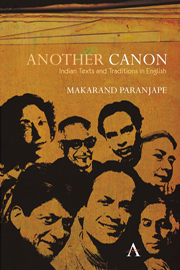Book contents
- Frontmatter
- Contents
- Preface
- 1 Introduction
- 2 Conversations in Bloomsbury
- 3 Comrade Kirillov
- 4 ‘A Horse and Two Goats’
- 5 The Tale of an Indian Education
- 6 ‘Clip Joint’
- 7 Cultural and Political Allegory in Rich Like Us
- 8 Towards Redefining Boundaries
- 9 The Golden Gate and the Quest for Self-Realization
- 10 Journey to Ithaca An Epistle on the Fiction of the 1980s and 1990s
- 11 Cuckold in Indian English Fiction
- 12 Stephanians and Others
- Works Cited
- Index
- Frontmatter
- Contents
- Preface
- 1 Introduction
- 2 Conversations in Bloomsbury
- 3 Comrade Kirillov
- 4 ‘A Horse and Two Goats’
- 5 The Tale of an Indian Education
- 6 ‘Clip Joint’
- 7 Cultural and Political Allegory in Rich Like Us
- 8 Towards Redefining Boundaries
- 9 The Golden Gate and the Quest for Self-Realization
- 10 Journey to Ithaca An Epistle on the Fiction of the 1980s and 1990s
- 11 Cuckold in Indian English Fiction
- 12 Stephanians and Others
- Works Cited
- Index
Summary
In my earlier monograph, Towards a Poetics of the Indian English Novel (2000), I had argued that English novels by Indians had a more complex genealogy than was normally supposed. That they were the inheritors of two different literary traditions, English and Indian, and also of two linguistic ones as Meenakshi Mukherjee suggested by dubbing them ‘twice born’ is by now well-recognized. But what was not equally clear was how we might understand and evaluate their larger civilizational burden. For this, one needed to connect them not only with other fictional works in many Indian languages or with those forms of narrative, such as vernacular prose chronicles or romances, which came before them, but also to the classical literary traditions, particularly the great epics of India. If we did so, we would not only be closer to defining their identity but also to evaluating them.
My earlier project, which tried to do this, was thus an endeavour to ‘define both the commonness and the uniqueness’ of the Indian English [IE] novel (12) and to see ‘how this genre has evolved and developed in the last 150 years’ so as to delineate the ‘tradition of the IE, to identify its main types, and to spell out its relation to the broader cultural formations of our country’ (12–13). I argued that the age-old framework of the purusharthas, enunciated not only in the Manu Smriti or the Mahabharata, but also in Bharata's Natyasastra, could come in handy.
- Type
- Chapter
- Information
- Another CanonIndian Texts and Traditions in English, pp. ix - xivPublisher: Anthem PressPrint publication year: 2009



